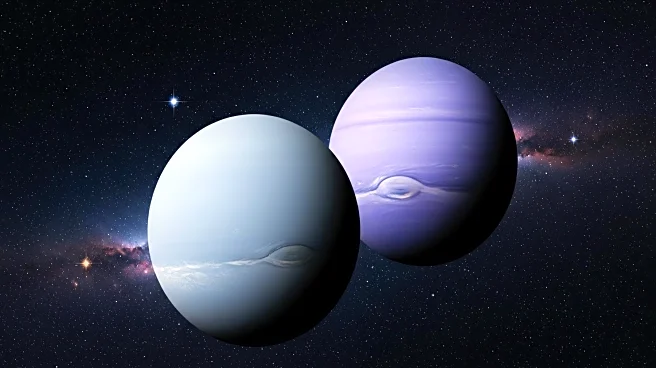What is the story about?
What's Happening?
Recent research challenges the long-held classification of Uranus and Neptune as 'ice giants.' Traditionally, these planets were thought to have interiors composed largely of water, ammonia, and other ices. However, new studies suggest that the interiors of these planets may be more complex and potentially dominated by rocky materials. This revelation comes from a pre-print study accepted for publication in Astronomy and Astrophysics, which utilized random modeling techniques to compare observational data with various interior compositions. The findings indicate that the rock-to-water ratio in Uranus and Neptune could vary significantly, suggesting that these planets might contain more rocky material than previously believed. This challenges existing models of solar system formation, which assumed a predominance of icy compounds in the outer solar system.
Why It's Important?
The reclassification of Uranus and Neptune from 'ice giants' to potentially 'rocky giants' could have significant implications for our understanding of solar system formation. If these planets contain more rocky material than previously thought, it may necessitate a reevaluation of how materials were distributed in the early solar system. This could impact theories regarding the formation and evolution of planetary bodies, influencing future research and exploration priorities. Additionally, understanding the true composition of these planets is crucial for developing accurate models of their magnetic fields and atmospheric dynamics, which have broader implications for planetary science.
What's Next?
To resolve the uncertainties surrounding the composition of Uranus and Neptune, a dedicated mission to these planets is necessary. High-quality data from an orbiter could provide definitive insights into their interiors, helping to clarify their classification and improve our understanding of planetary formation. Such missions would require significant investment and international collaboration, but they could yield valuable scientific knowledge that enhances our comprehension of the solar system.
Beyond the Headlines
The potential reclassification of Uranus and Neptune highlights the limitations of current planetary exploration and the need for more direct observation. It underscores the importance of advancing space exploration technologies and missions to gather more comprehensive data. This development also reflects the dynamic nature of scientific inquiry, where new methodologies can challenge established paradigms and lead to groundbreaking discoveries.















